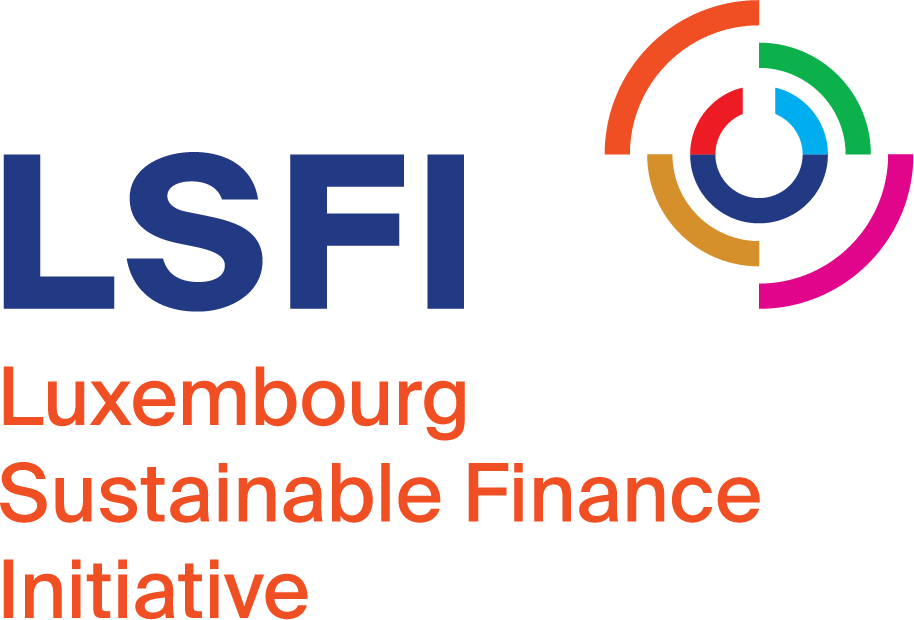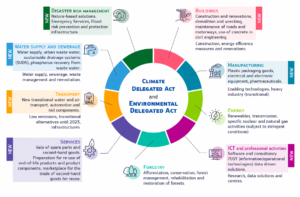Taxonomy
The EU Taxonomy Regulation (EU Taxonomy – Regulation (EU) 2020/852) is a Regulation introduced by the European Commission establishing criteria to define environmentally sustainable economic activities for investment purposes. Therefore, it is a classification system which establishes the conditions for certain economic activities(1) to be considered “environmentally sustainable” and, therefore, being “Taxonomy-aligned”.
An economic activity included in the EU Taxonomy is defined as “Taxonomy eligible.” However, in order to be considered “Taxonomy-aligned,” a taxonomy-eligible activity should contribute substantially to at least one of the following six environmental objectives:
- Climate change mitigation;
- Climate change adaptation;
- The sustainable use and protection of water and marine resources;
- The transition to a circular economy;
- Pollution prevention and control;
- The protection and restoration of biodiversity and ecosystems.
Besides contributing to at least one of the environmental objectives, the activity must also successfully pass two other conditions to be defined as “Taxonomy-aligned”:
- Not significantly harming any other of the environmental objectives (Do No Significant Harm principle, also known as “DNSH”);
- Complying with a set of defined minimum social safeguards.
The detailed criteria to successfully pass all of the conditions mentioned in the paragraph above are established through Delegated Acts. The Delegated Act (EU) 2021/2139, amended by the Delegated Act (EU) 2023/2485(2), clarifies the conditions for the two climate change-related objectives, while the latest Delegated Act (EU) 2023/2486 adopted in 2023 clarifies the conditions for the remaining 4 environmental objectives.
Further details on these conditions are provided below:
- The technical screening criteria are scientific-based quantitative and qualitative requirements and thresholds that an eligible economic activity must meet to be considered “significantly contributing to a sustainable objective”. These criteria are economic activity- and environmental objective-specific;
- The Do No Significant Harm principle defines the criteria that eligible economic activities must respect to ensure that they do not generate any significant negative impact on the other EU Taxonomy objectives;
- Minimum social safeguards ensure that a company and its economic activity(ies) adhere to the following internationally-recognised standards and guidelines:
- The OECD Guidelines for Multinational Enterprises;
- The UN Guiding Principles on Business and Human Rights;
- The principles and rights set out in the eight fundamental conventions identified in the Declaration of the International Labour Organisation on Fundamental Principles and Rights at Work and the International Bill of Human Rights.
The EU Taxonomy currently covers the following sectors and economic activities.
The technical screening criteria for the first two environmental objectives, namely climate change mitigation and climate change adaptation defined by the Delegated Act 2021/2139 cover economic activities of roughly 40% of listed corporates in sectors responsible for almost 80% of direct greenhouse gas emissions in Europe. Extending the EU Taxonomy criteria to the other four objectives will increase this coverage.
The EU Taxonomy currently does not cover social dimensions. The European Platform on Sustainable Finance – a permanent expert group of the European Commission established to assist with the development of sustainable finance policies – published a report on Social Taxonomy in February 2022. This report includes recommendations for the development of an EU Social Taxonomy. Currently, the works and discussions towards the EU Social Taxonomy have been paused indefinitely to prioritise other EU initiatives.
Notes:
(1) An economic activity means every activity a company performs that uses resources (e.g., labour) to generate a product (e.g., goods or services).
(2) The Delegated Act (EU) 2023/2485 introduces Technical Screening Criteria for four additional economic activities and addresses certain technical and legal inconsistencies of Delegated Act (EU) 2021/2139.
The EU Taxonomy aims to create a framework for a common understanding of environmentally sustainable activities, aiming at scaling up investments that contribute to achieving a climate neutral economy.
Therefore, the EU Taxonomy seeks to be a transparency tool helping corporates, investors and policymakers to consider certain economic activities as environmentally sustainable thanks to scientific-based definitions and criteria.
The EU Taxonomy applies to Financial Market Participants (FMPs) and their products.
The EU Taxonomy requires FMPs and certain companies to disclose the extent to which their investments or activities, respectively, are aligned with the EU Taxonomy. This disclosure is required to be included in their non-financial statement.
The definition of FMPs(3) follows the one set out in the Sustainable Finance Disclosure Regulation (SFDR – Regulation (EU) 2019/2088). Visit SFDR for more information.
The companies that are in scope are those which are subject to the Non-Financial Disclosure Directive (NFRD – Directive 2014/95/EU) that has been replaced by the Corporate Sustainable Reporting Directive (CSRD – Directive (EU) 2022/2464). These include, amongst others(4) (these characteristics are subject to change under the new Omnibus initiative):
- EU-based companies which have been in scope of the NFRD
- EU-based companies exceeding two of the following three criteria on two consecutive balance sheet dates (Large undertakings):
- 250 employees
- €50M net turnover
- €25M balance sheet
- EU-based small and medium-sized companies (SMEs) which are listed and meet two of the following three criteria:
- >10 but <250 employees
- >€900k but <€50M net turnover
- >€450k but <€25M balance sheet
These companies have to disclose information on:
- The share of turnover and/or;
- The share of expenditures (capital expenditures – CAPEX and/or operational expenditures – OPEX) related to their activities aligned with the EU Taxonomy.
Under the Omnibus proposal, the characteristics to define whether companies are in scope of the reporting obligations or not would vary significantly:
- For companies in scope of the NFRD and large EU-based undertakings the criteria for the number of employees would be increased to a mandatory threshold of at least 1000
- EU-based listed SMEs would completely drop out of scope
Please note that CSRD foresees a specific application timeline based on the characteristics mentioned above. Visit CSRD for more information.
Notes:
(3) In general, FMPs are actors that take part in the market by purchasing and offering financial assets. Amongst others, FMPs in scope are: Alternative investment fund managers (AIFMs); UCITS management companies; Investment firms; Credit institutions providing portfolio management services.
(4) To be noted that the European Commission adopted a Delegated Directive on 17 October 2023 that amends Directive 2013/34/EU (Reference: C(2023) 7020). These changes aim to adjust the thresholds for determining the size category of a company. Particularly, the Delegated Directive foresees an increase of 25% of the balance sheet and net turnover thresholds to consider the effects of inflation. The Delegated Directive is planned to be adopted by the European Parliament and the European Council in Q4 2023.
FMPs in the scope of the EU Taxonomy must include information on the alignment of the investments of their products with the EU Taxonomy. FMPs must include this information within the periodic reports they are required to draw up for their financial products on an annual basis. The required information depends on the sustainability ambition of a product as per SFDR:
- For all products that do not have any sustainability ambition ( 6 products), they must include a pre-defined sentence;
- For all products that either promote environmental and/or social characteristics ( 8 products) or have sustainability as their objective (Art. 9 products), they must disclose the actual share of investments aligned with the EU Taxonomy as per the SFDR template (visit the SFDR section for further information).
Moreover, as mentioned in the section “To whom does it apply?” above, FMPs in scope of the CSRD will have to disclose the proportion of investments that are aligned with the EU Taxonomy in provided reporting templates.
It should be taken into consideration that under the new Omnibus proposal, if accepted as anticipated, the reporting templates will be simplified, leading to a reduction of data points by almost 70%. Only companies within the scope of the CSRD with a net turnover exceeding €450M need to publish these templates in their CSRD report; the others can benefit from an “opt-in” regime. Visit CSRD for more information.
The EU Taxonomy is closely linked to the Sustainable Finance Disclosure Regulation (SFDR). As stated in recital 33 of the SFDR Regulatory Technical Standards (SFDR RTS – Delegated Regulation (EU) 2022/1288), as well as in other various articles, product-related information – including the Taxonomy-alignment of investments – have to be provided to (potential) investors. Visit SFDR for more information.
The EU Taxonomy is also linked to the Corporate Sustainability Reporting Directive (CSRD). As mentioned in the Article 8 of the EU Taxonomy, entities that are in scope of the NFRD and/or CSRD will face specific obligations for the provision of information on environmentally sustainable activities as mentioned in the sections above. Visit CSRD for more information(5).
Notes:
(5) The EU Commission notice on Taxonomy Reporting (C/2023/305), issued on the 20 October 2023, provides some valuable insights to address common questions about Taxonomy Reporting under Article 8. The FAQs encompass a range of essential topics, such as addressing double counting, understanding consolidation, and determining materiality thresholds for Key Performance Indicators (KPIs) to be reported in the sustainability report under the CSRD.
The Luxembourg Law of 25 February 2022 implementing the Regulation (EU) 2019/2088 (SFDR) and the Regulation (EU) 2020/852 (EU Taxonomy Regulation) explicitly confirms that the Commission de Surveillance du Secteur Financier (CSSF) and the Commissariat aux Assurances (CAA) are the competent authorities responsible in Luxembourg for the supervision of the proper implementation of the SFDR and the EU Taxonomy Regulation by all financial market participants and financial advisers.
26 October 2022 – CSSF Sustainability Disclosures for Issuers – A first look on information reported under Article 8 of the Taxonomy Regulation for the transition year.
- 12 July 2020: Entry into force of the EU Taxonomy;
- 30 December 2021: Entry into force of the Delegated Act on disclosures in line with the EU Taxonomy;
- 01 January 2022: Application of the first Delegated Act 2021/2139 for economic activities contributing to climate change adaptation and climate change mitigation(6);
- 01 January 2023: Application of the EU Taxonomy extension for specific gas and nuclear activities;
- 01 January 2024: Application date of the second Delegated Act (EU) 2023/2486 for economic activities contributing to the remaining four environmental objectives: the sustainable use and protection of water and marine resources, the transition to a circular economy, pollution prevention and control, or the protection and restoration of biodiversity and ecosystems;
-
01 January 2024: Application date of the Delegated Act (EU) 2023/2485 supplementing the Taxonomy Regulation (EU) 2020/852 and amending Regulation (EU) 2021/2139 on Climate change mitigation and adaptation(7).
- 1 January 2026: Retroactive application date for Commission Delegated Regulation (EU) 2026/73 simplifying Taxonomy disclosures, introducing materiality thresholds, and revising DNSH criteria.
- 28 January 2026: Entry into force of the Delegated Act amending the Disclosures, Climate and Environmental Delegated Acts as part of the Omnibus Initiative.
Notes:
(6) The EU Commission notice C/2023/267, issued on 20 October 2023, clarifies some aspects of the application of the EU Taxonomy for climate objectives. It comprises three sections:
- Section I covers general questions, including periodic technical screening criteria reassessment and consequences for companies lacking Taxonomy-aligned activities;
- Section II addresses 187 sector-specific questions on technical screening criteria;
- Section III provides guidance on recurring DNSH criteria for climate adaptation, pollution control, and biodiversity protection within the Taxonomy application.
(7) For the targeted amendments to DNSH screening criteria relating to substances of very high concern in a product, the application date is 1 January 2025 instead of 1 January 2024.
- 22 June 2020: The EU Taxonomy was published in the Official Journal of the EU;
- 12 July 2020: The EU Taxonomy entered into force;
- 9 December 2021: Following a consultation period, a first Delegated Act 2021/2139 on sustainable activities for climate change adaptation and climate change mitigation objectives was published in the Official Journal of the EU. It is applicable since 01 January 2022;
- The second Delegated Act for the remaining four objectives was supposed to be published in 2022. The draft of this second Delegated Act was published on 5 April 2023 by the European Commission. In addition, the European Commission published an additional Delegated Act amending the first Delegated Act 2021/2139. This amendment aimed to add or complement the technical screening criteria for climate change mitigation for certain economic activities in the transport and manufacturing sectors;
- 3 May 2023: Close of the feedback period on the second Delegated Act for the remaining 4 environmental objectives;
- 27 June 2023: The proposal Delegated Act for the remaining four environmental objectives was adopted;
- 17 October 2023: the European Platform on Sustainable Finance launched its Taxonomy Stakeholder Request Mechanism;
- 17 October 2023: The European Commission recently approved a Delegated Directive to adjust size categories to account for inflation. The Delegated Directive is set for adoption by the European Parliament and the EU Council in Q4 2023;
- 21 November 2023: The final text of the Delegated Act (EU) 2023/2486 for the remaining four environmental objectives was published on the Official Journal of the EU;
- 21 November 2023: The final text of the Delegated Act (EU) 2023/2485 supplementing the Taxonomy Regulation (EU) 2020/852 and amending Regulation (EU) 2021/2139 on Climate change mitigation and adaptation was published on the Official Journal of the EU. The Delegated Act (EU) 2023/2485 introduces Technical Screening Criteria for four additional economic activities and addresses certain technical and legal inconsistencies of Delegated Act (EU) 2021/2139;
- 11 December 2023: Entry into force of the above-mentioned Delegated Act (EU) 2023/2486 and of the Delegated Act (EU) 2023/2485;
- 15 December 2023: All submitted requests received via the Taxonomy Stakeholder Request Mechanism will be processed by the Platform’s Technical Working Group;
- 01 January 2024: Application of the Delegated Act (EU) 2023/2486 for the remaining four environmental objectives;
- 01 January 2024: Application date of the above-mentioned Delegated Act (EU) 2023/2485(8).
- 26 February 2025: The European Commission published Omnibus Initiative to reduce sustainability disclosure requirements and administrative burdens as part of its plan to strengthen competitiveness and boost growth in the EU. The resulting Regulations & Acts are published individually during 2026.
- 28 January 2026: Entry into force of Delegated Act as Annex to the Delegated Regulation (EU) 2021/2178 simplifying the implementation of Taxonomy-related disclosure requirements by streamlining technical criteria and aligning reporting obligations across climate and environmental objectives as part of the Omnibus Initiative.
- 28 January 2026: Entry into force of Commission Delegated Regulation (EU) 2026/73 simplifying Taxonomy disclosures, introducing materiality thresholds, and revising DNSH criteria as part of the Omnibus Initiative.
Disclaimer: Please note that in order to ensure that this section is kept synthetic and focuses on the most relevant dates, the adoption dates have not been included here.
Notes:
(8) For the targeted amendments to DNSH screening criteria relating to substances of very high concern in a product, the application date is 1 January 2025 instead of 1 January 2024.
On 17 October 2023, the European Platform on Sustainable Finance launched its Taxonomy Stakeholder Request Mechanism, seeking input from stakeholders on the EU Taxonomy. Stakeholders can propose new economic activities supported by scientific evidence or suggest revisions to existing technical screening criteria.
The first cut-off date was 15 December 2023 and all requests by that date were reviewed by the Platform’s Technical Working Group. The Stakeholder Mechanism remained operational beyond this date, with a subsequent cutoff date to be announced within 2025.
The European Commission will evaluate the Platform’s recommendations and determine whether amendments to the EU Taxonomy Delegated Acts are necessary.
The request mechanism remains open continuously and accepts submissions at any time. Requests are processed in batches according to set cut‑off dates. The next cut-off date has not been published yet.
EU Level:
- EU Taxonomy Regulation (EU) 2020/852
- Climate Delegated Act – Commission Delegated Regulation (EU) 2021/2139
- Environmental Delegated Act – Commission Delegated Regulation (EU) 2023/2486
- Disclosures Delegated Act (Article 8) – Commission Delegated Regulation (EU) 2021/2178
- EU Taxonomy Compass
Luxembourg Level:


